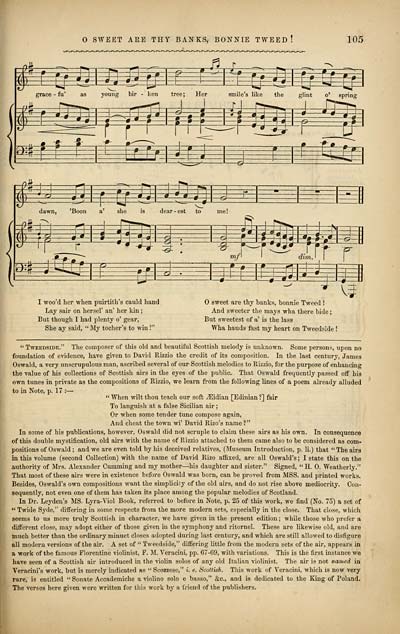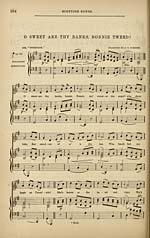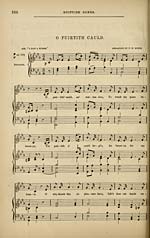Inglis Collection of printed music > Printed music > Songs of Scotland adapted to their appropriate melodies > Volume 1
(121) Page 105
Download files
Complete book:
Individual page:
Thumbnail gallery: Grid view | List view

SWEET ARE THY BANKS, BONNIE TWEED !
105
ft
=13
ja
-£
^^S
^
&
^t£=F
•jfc
££eIeE
P:
grace - fu' as young bir - ken tree; Her
5F
£f
«E
&*a#M*ii^
smile's like the glint o' spring
m
-m^mmam
t^m
I woo'd her when puirtith's caukl hand
Lay sair on hersel' an' her kin ;
But though I had plenty o' gear,
She ay said, " My tocher's to win !"
sweet are thy banks, bonnie Tweed !
And sweeter the mays wha there bide ;
But sweetest of a' is the lass
Wha bauds fast my heart on Tweedside !
" Tweedside." The composer of this old and beautiful Scottish melody is unknown. Some persons, upon no
foundation of evidence, have given to David Rizzio the credit of its composition. In the last century, James
Oswald, a very unscrupulous man, ascribed several of our Scottish melodies to Rizzio, for the purpose of enhancing
the value of his collections of Scottish airs in the eyes of the public. That Oswald frequently passed off his
own tunes in private as the compositions of Rizzio, we learn from the following lines of a poem already alluded
to in Note, p. 17 : —
" When wilt thou teach our soft iEidian [Edinian?] fair
To languish at a false Sicilian air ;
Or when some tender tune compose again,
And cheat the town wi' David Rizo's name?"
In some of his publications, however, Oswald did not scruple to claim these airs as his own. la consequence
of this double mystification, old airs with the name of Rizzio attached to them came also to be considered as com-
positions of Oswald ; and we are even told by his deceived relatives, (Museum Introduction, p. li.) that " The airs
in this volume (second Collection) with the name of David Rizo affixed, are all Oswald's; I state this on the
authority of Mrs. Alexander dimming and my mother— his daughter and sister." Signed, " H. 0. Weatherly."
That most of these airs were in existence before Oswald was born, can be proved from MSS. and printed works.
Besides, Oswald's own compositions want the simplicity of the old airs, and do not rise above mediocrity. Con-
sequently, not even one of them has taken its place among the popular melodies of Scotland.
In Dr. Leyden's MS. Lyra-Viol Book, referred to before in Note, p. 25 of this work, we find (No. 75) a set of
" Twide Syde," ditfering in some respects from the more modern sets, especially in the close. That close, which
seems to us more truly Scottish in character, we have given in the present edition ; while those who prefer a
different close, may adopt either of those given in the symphony and ritornel. These are likewise old, and are
much better than the ordinary minuet closes adopted during last century, and which are still allowed to disfigure
all modern versions of the air. A set of " Tweedside," differing little from the modern sets of the air, appears in
a work of the famous Florentine violinist, F. M. Veracini, pp. 67-69, with variations. This is the first instance we
have seen of a Scottish air introduced in the violin solos of any old Italian violinist. The air is not named in
Veracini's work, but is merely indicated as " Scozzese," i. e. Scottish. This work of Veracini, which is now very
rare, is entitled " Sonate Accademiche a violino solo e basso," &c, and is dedicated to the King of Poland.
The verses here given were written for this work by a friend of the publishers.
105
ft
=13
ja
-£
^^S
^
&
^t£=F
•jfc
££eIeE
P:
grace - fu' as young bir - ken tree; Her
5F
£f
«E
&*a#M*ii^
smile's like the glint o' spring
m
-m^mmam
t^m
I woo'd her when puirtith's caukl hand
Lay sair on hersel' an' her kin ;
But though I had plenty o' gear,
She ay said, " My tocher's to win !"
sweet are thy banks, bonnie Tweed !
And sweeter the mays wha there bide ;
But sweetest of a' is the lass
Wha bauds fast my heart on Tweedside !
" Tweedside." The composer of this old and beautiful Scottish melody is unknown. Some persons, upon no
foundation of evidence, have given to David Rizzio the credit of its composition. In the last century, James
Oswald, a very unscrupulous man, ascribed several of our Scottish melodies to Rizzio, for the purpose of enhancing
the value of his collections of Scottish airs in the eyes of the public. That Oswald frequently passed off his
own tunes in private as the compositions of Rizzio, we learn from the following lines of a poem already alluded
to in Note, p. 17 : —
" When wilt thou teach our soft iEidian [Edinian?] fair
To languish at a false Sicilian air ;
Or when some tender tune compose again,
And cheat the town wi' David Rizo's name?"
In some of his publications, however, Oswald did not scruple to claim these airs as his own. la consequence
of this double mystification, old airs with the name of Rizzio attached to them came also to be considered as com-
positions of Oswald ; and we are even told by his deceived relatives, (Museum Introduction, p. li.) that " The airs
in this volume (second Collection) with the name of David Rizo affixed, are all Oswald's; I state this on the
authority of Mrs. Alexander dimming and my mother— his daughter and sister." Signed, " H. 0. Weatherly."
That most of these airs were in existence before Oswald was born, can be proved from MSS. and printed works.
Besides, Oswald's own compositions want the simplicity of the old airs, and do not rise above mediocrity. Con-
sequently, not even one of them has taken its place among the popular melodies of Scotland.
In Dr. Leyden's MS. Lyra-Viol Book, referred to before in Note, p. 25 of this work, we find (No. 75) a set of
" Twide Syde," ditfering in some respects from the more modern sets, especially in the close. That close, which
seems to us more truly Scottish in character, we have given in the present edition ; while those who prefer a
different close, may adopt either of those given in the symphony and ritornel. These are likewise old, and are
much better than the ordinary minuet closes adopted during last century, and which are still allowed to disfigure
all modern versions of the air. A set of " Tweedside," differing little from the modern sets of the air, appears in
a work of the famous Florentine violinist, F. M. Veracini, pp. 67-69, with variations. This is the first instance we
have seen of a Scottish air introduced in the violin solos of any old Italian violinist. The air is not named in
Veracini's work, but is merely indicated as " Scozzese," i. e. Scottish. This work of Veracini, which is now very
rare, is entitled " Sonate Accademiche a violino solo e basso," &c, and is dedicated to the King of Poland.
The verses here given were written for this work by a friend of the publishers.
Set display mode to: Large image | Transcription
Images and transcriptions on this page, including medium image downloads, may be used under the Creative Commons Attribution 4.0 International Licence unless otherwise stated. ![]()
| Special collections of printed music > Inglis Collection of printed music > Printed music > Songs of Scotland adapted to their appropriate melodies > Volume 1 > (121) Page 105 |
|---|
| Permanent URL | https://digital.nls.uk/94708424 |
|---|
| Shelfmark | Ing.127 |
|---|---|
| Additional NLS resources: | |
| Attribution and copyright: |
|
| Description | Scottish and English songs, military music and keyboard music of the 18th and 19th centuries. These items are from the collection of Alexander Wood Inglis of Glencorse (1854 to 1929). Also includes a few manuscripts, some treatises and other books on the subject. |
|---|
| Description | The Glen Collection and the Inglis Collection represent mainly 18th and 19th century Scottish music, including Scottish songs. The collections of Berlioz and Verdi collected by bibliographer Cecil Hopkinson contain contemporary and later editions of the works of the two composers Berlioz and Verdi. |
|---|

